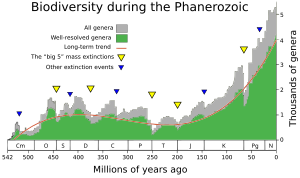| This biography of a living person needs additional citations for verification. Please help by adding reliable sources. Contentious material about living persons that is unsourced or poorly sourced must be removed immediately from the article and its talk page, especially if potentially libelous. Find sources: "Alexander V. Markov" – news · newspapers · books · scholar · JSTOR (March 2017) (Learn how and when to remove this message) |
| Alexander Vladimirovich Markov | |
|---|---|
 Markov in 2020 Markov in 2020 | |
| Born | October 24, 1965 (1965-10-24) (age 59) Russia, Soviet Union |
| Education | Doctor of Science, Professor |
| Alma mater | Moscow State University (1987) |
| Scientific career | |
| Fields | Paleontology |
| Institutions | Moscow State University |
| Aleksandr Markov's voice Markov on the Echo of Moscow program, 21 December 2013 | |
Alexander V. Markov (born October 24, 1965) is a Russian biologist, paleontologist, popularizer of science. Prize winner (2011) of the main Russian prize for popular science ("Prosvetitel").
Markov graduated from the Moscow State University (Faculty of Biology) in 1987. He has been working in the Paleontological Institute of the Russian Academy of Sciences since 1987. Doctor of biological sciences, Senior Research Professor of the Paleontological Institute, RAS. Professor of the RAS.

In collaboration with Andrey Korotayev he has demonstrated that a rather simple mathematical model can be developed to describe in a rather accurate way the macrotrends of biological evolution. They have shown that changes in biodiversity through the Phanerozoic correlate much better with hyperbolic model (widely used in demography and macrosociology) than with exponential and logistic models (traditionally used in population biology and extensively applied to fossil biodiversity as well). The latter models imply that changes in diversity are guided by a first-order positive feedback (more ancestors, more descendants) and/or a negative feedback arising from resource limitation. Hyperbolic model implies a second-order positive feedback. The hyperbolic pattern of the world population growth has been demonstrated by Korotayev to arise from a second-order positive feedback between the population size and the rate of technological growth. According to Markov and Korotayev, the hyperbolic character of biodiversity growth can be similarly accounted for by a feedback between the diversity and community structure complexity. They suggest that the similarity between the curves of biodiversity and human population probably comes from the fact that both are derived from the interference of the hyperbolic trend with cyclical and stochastic dynamics.
References
- {{http://www.vesti.ru/doc.html?id=641234&cid=7]}}
- Markov, A.; Korotayev, A. (December 2007). "Phanerozoic marine biodiversity follows a hyperbolic trend". Palaeoworld. 16 (4): 311–318. doi:10.1016/j.palwor.2007.01.002.
- Markov, A.; Korotayev, A. (2008). "Hyperbolic growth of marine and continental biodiversity through the Phanerozoic and community evolution". Journal of General Biology. 69 (3): 175–194. PMID 18677962.
Sources
- "Markov, Alexander V." Соционауки. Retrieved January 9, 2012.